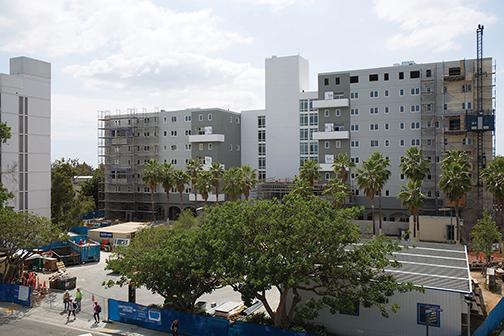The Zura Hall residential living community focused on sustainability and surfing attended the Sustainable Stoke Conference along with several important figures in the surfing industry.
The conference took place on Saturday, Sept. 19 and centered on the evolution of the surfing business, as well as the industry’s shift in focus toward sustainability.
Jess Ponting, from the Center for Surf Research, opened the conference with an overview regarding transitioning to sustainable practices.
Kevin Whilden is a co-founder of Sustainable Surf. As a surfer and geologist he has focused on addressing climate change issues.
“Surfing is the number one lifestyle sport,” Whilden said. “It’s the number one sport in America that kids want to learn.”
Whilden said all surfers should be concerned about the negative impacts of ocean pollution.
“Everybody in this room should be scared about what’s happening in the ocean,” Whilden said. “If we don’t start doing something serious really soon, it’s going to be too late.”
Coral reef extinction, high sea levels and plastic debris are some potential threats to marine life discussed by the panel.
The conference encouraged the use of eco boards, or surfboards made by a process that produces 40-percent less carbon dioxide emissions.
The use of eco-boards has been incorporated into Zura’s interior design, with real surfboards decorating the walls by the entrance and each floor.
“Surfboards are very toxic, which is a problem for indoor air quality in the dorms,” said Carl Kish, co-founder of STOKED Certified and SDSU alumnus. “So we sought out five surfboard shapers who are progressing sustainable surfboard design.”
With Zura’s rennovation, the designers emphasized a sustainability theme. It incorporates the surfing culture and San Diego lifestyle, Kish said.
“Connecting the sustainability mindset of surfers into the interior design while meeting the sustainable design and construction goals of renovating Zura was a no-brainer,” he said.
While the conference focused on change occurring in the oceans, Zura Hall represents a change in residential hall construction that puts an emphasis on sustainable building materials.
Architech Kurt Haapala said Zura’s design is intended to educate.
“Zura was designed with a focus on improving operational efficiencies, academic integration, enhancing a sense of community, promoting equity and diversity, and celebrating culture,” Haapala said.
These upgrades include such innovations as a new way to discard of recycling and trash, renovated security elevators and new study halls for students.
A major part of Zura caters to student surfers. A surf storage and repair station was added to the building to provide a place for surfers to wash and store their gear.











